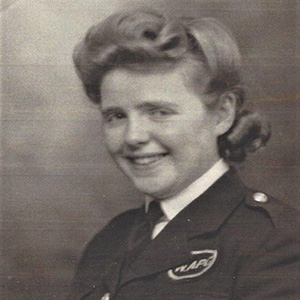Due to Margaret’s dementia, it wasn’t possible to interview her. Instead, her son Malcolm provided the following information based on several conversations with his mother.
Margaret left school at 15 and started work in an insurance office. While working there, she attended night school to learn shorthand. When she was 18, she saw an advert for the police for which shorthand was a requirement. The pay was better than she was earning in the insurance office, so she left and joined the Accrington Police Force, which later became part of the Lancashire force. She was stationed on Manchester Road. This was around 1943 and women were increasingly taking on traditional male roles as part of the war effort, and her family were pleased with the move.
Margaret earned more than other police constables, because of her shorthand. But until she married, she didn’t keep a penny of her wages. It all went straight back to mum who held out a clean pinny at the end of the week, and Margaret would tip her wages into it.
It seems that the police felt rather protective of their female constables. One night she was called out after midnight to take some statements for court the next morning. The case involved homosexual activity, which was then illegal. The sergeant was quite shocked and didn’t think she should have to hear about “things like that.”
Margaret worked mainly in the charge office. There were 3 shifts, 8am-4pm, 4pm-12 midnight and then midnight till 8. Whenever she worked a night shift, the sergeant would walk her home to make sure she got there safely.
All police constables would turn out for morning parade with truncheons, whistles and notebooks at the ready. When out on the beat, they would use the police phone boxes to ring in at regular intervals. In emergencies, they would blow their whistles – there were no radios or mobile phones.
On one occasion, while policing a football match at Peel Park, Margaret patrolled the perimeter of the pitch with female colleagues. The resulting wolf whistles and cat calls were such that they had to be sent back to the police station, as the attention they were getting detracted from the football.
Unlike many other civil service roles, Margaret continued to work in the police force after she married, however she left when she became pregnant with her first child at the age of 24 years.
Once married, Margaret and her husband were able to keep their wages for the first time in their working lives! They opened a greengrocer’s shop in Higher Antley Street in Accrington and her husband worked at Spencer Beatties until their first child, Malcom, turned 18.
When Malcolm grew up, he followed in her footsteps and became a policeman. He says Margaret still speaks with great pride of her time in the force.





